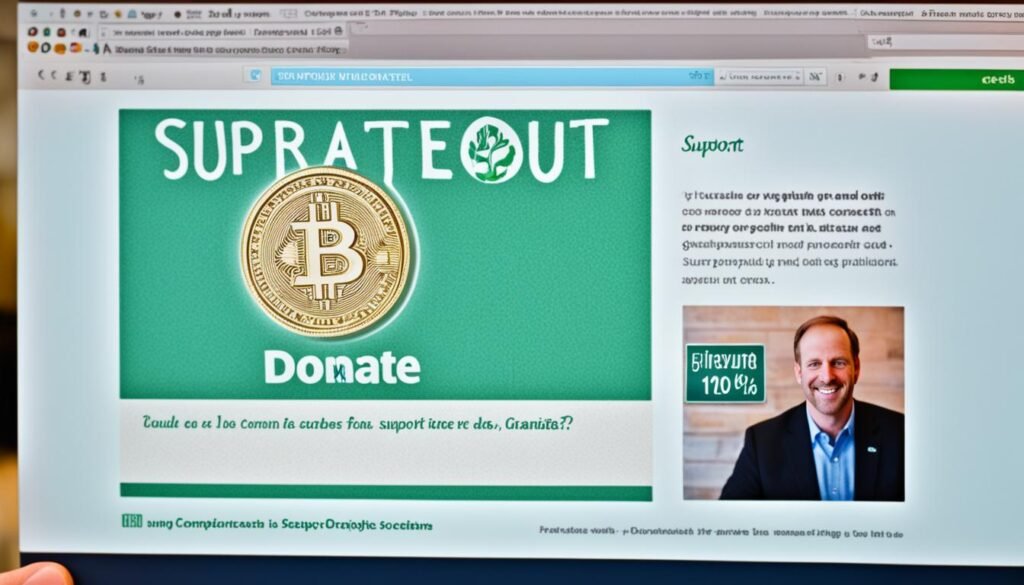Monetizing a blog or website is a common goal for many bloggers and website owners. There are several strategies you can use to monetize your blog and generate income. These strategies include selling products or services, creating gated content, and promoting external brands. By implementing these monetization methods effectively, you can turn your blog or website into a profitable venture.
Key Takeaways: Monetize My Blog or Website
- There are various ways to monetize a blog, such as selling products or services, creating gated content, and promoting external brands.
- Implementing effective monetization methods can turn your blog or website into a profitable venture.
- Explore different monetization strategies and choose the ones that align with your blog’s niche and target audience.
- Consistently providing valuable content is crucial for attracting and retaining readers who can contribute to your blog’s monetization.
- Monitor and adapt your monetization strategies based on the performance and feedback of your audience.
Ways to Monetize Your Blog as a Beginner
As a beginner blogger, there are several ways you can monetize your blog and start making money. These include:
- Making money from online ads
- Asking for donations from your audience
- Becoming a freelance blogger
- Selling eBooks
- Engaging in affiliate marketing
- Writing sponsored posts
- Getting sponsored by a brand
Making Money from Online Ads
One of the most common and popular ways to monetize a blog is by displaying online ads on your website. By joining advertising networks like Google AdSense, you can place relevant ads on your blog, earning income from every view or click.
Asking for Donations
Another way to monetize your blog is by asking for donations from your audience. If your blog provides valuable content and has a loyal following, your readers may be willing to donate to support your work financially.
Becoming a Freelance Blogger
If you have strong writing skills and expertise in a particular niche, you can monetize your blog by becoming a freelance blogger. Use your blog as a portfolio to attract clients and earn income by writing for other blogs and online publications.
Selling eBooks
Create and sell eBooks that provide valuable and in-depth content to your audience. This allows you to leverage your expertise and generate passive income as you continue to sell your eBooks over time.
Engaging in Affiliate Marketing
Affiliate marketing is an effective way to monetize your blog by earning a commission for promoting products or services through affiliate programs. Choose products that align with your blog’s niche and provide value to your audience.
Writing Sponsored Posts
Write sponsored posts by collaborating with brands to create content that highlights their products or services. Brands are willing to pay bloggers for this type of advertising, providing an opportunity for you to monetize your blog.
Getting Sponsored by a Brand
Establish partnerships with brands to have your blog sponsored. This collaboration may include financial support, product collaborations, or other forms of sponsorship, allowing you to monetize your blog and promote brands that resonate with your audience.
By implementing these monetization methods and focusing on your blog’s niche and target audience, you can monetize your blog and start generating income as a beginner blogger.
Making Money from Online Ads
One of the most common and popular ways to monetize a blog is by displaying online ads on your website. Placing ads on your blog can be a lucrative way to generate income and start making money from your content. By partnering with an advertising network such as Google AdSense, you can easily incorporate relevant ads into your blog.
Creating valuable and engaging content is essential to attract a steady stream of visitors and increase your page views. The more traffic your blog receives, the higher the potential earnings from online ads. It is important to focus on creating content that resonates with your target audience and keeps them coming back for more.
When implementing online ads, it is crucial to strike a balance between ad placement that captures the attention of your readers and maintaining seamless user experience. Carefully consider where you place the ads on your blog to ensure they are visible but not intrusive.
“Online ads are an effective way to monetize your blog and make money blogging. By partnering with ad networks and creating valuable content, you can start earning revenue from your blog.”
Additionally, it’s important to note that the success of your ad monetization strategy depends on factors such as your blog’s niche, target audience, and the relevance of the ads to your content. By continuously monitoring your ad performance and making adjustments as necessary, you can optimize your earnings and maximize the potential of your blog’s ad space.
By strategically utilizing online ads on your blog, you can create a passive income stream and start making money from your blogging efforts. It’s a popular method employed by many successful bloggers, making it one of the go-to options for blog monetization.
Asking for Donations

In addition to implementing various monetization strategies, another way to generate income for your blog is by asking for donations from your loyal audience. If your blog consistently provides high-quality content that resonates with your readers and adds value to their lives, they may be willing to financially support your work.
To facilitate the donation process, you can set up a donation button or create a crowdfunding campaign directly on your blog. This allows your audience to contribute and show their appreciation for the valuable content you provide. Transparency and gratitude are key when asking for donations, as it establishes trust and encourages continued support.
Your loyal audience understands the effort and commitment required to consistently deliver quality content. By fostering a sense of community and engagement, you can cultivate a loyal and supportive audience who is more likely to donate and help sustain your blog financially.
Asking for donations not only helps to generate financial support, but it also strengthens the bond between you and your audience. When your readers see how much their contributions mean to you and witness the positive impact their support has on the sustainability of your blog, it creates a sense of shared accomplishment and purpose.
The Benefits of Asking for Donations:
- Financial support: Donations can provide a reliable source of income, helping to cover expenses and invest in the growth of your blog.
- Freedom and flexibility: Relying on donations allows you to maintain creative control and independence, as you are not tied to specific advertisers or brands.
- Quality content: With financial support from your audience, you can allocate more time and resources to creating high-quality content that meets their needs and exceeds their expectations.
- Engaged and loyal audience: By cultivating a supportive community around your blog, you can establish a loyal and engaged audience who are more likely to donate and promote your content.
Donations from your audience can play a significant role in helping you continue to deliver the quality content your readers enjoy and depend on. With their financial support, you can focus on creating valuable and insightful articles, videos, or podcasts that cater to their specific interests and needs.
By asking for donations, you give your audience an opportunity to demonstrate their appreciation for your work and create a mutually beneficial relationship. The act of donating can be a gratifying experience, as it allows your audience to actively support the content they love and help shape the future of your blog.
Creating a Donation Campaign
When setting up a donation campaign on your blog, it’s important to provide clear instructions and communicate its purpose effectively. Here are some key steps to consider:
- Create a dedicated page or section on your blog specifically for donations.
- Explain why you are asking for donations and how it will directly benefit your readers and the future of your blog.
- Offer different donation options, such as one-time contributions or recurring monthly donations.
- Provide a secure and trusted payment gateway to ensure the safety of your audience’s financial information.
- Show appreciation and gratitude to your donors by publicly recognizing and thanking them for their support.
- Regularly update your audience on how their donations have helped improve your blog or the specific projects their contributions have funded.
| Benefits of Asking for Donations | Steps for Creating a Donation Campaign |
|---|---|
| Financial support | Create a dedicated page or section on your blog specifically for donations |
| Freedom and flexibility | Explain why you are asking for donations and how it will directly benefit your readers and the future of your blog |
| Quality content | Offer different donation options, such as one-time contributions or recurring monthly donations |
| Engaged and loyal audience | Provide a secure and trusted payment gateway to ensure the safety of your audience’s financial information |
| Show appreciation and gratitude to your donors by publicly recognizing and thanking them for their support | |
| Regularly update your audience on how their donations have helped improve your blog or the specific projects their contributions have funded |
Becoming a Freelance Blogger

If you have excellent writing skills and expertise in a specific niche, you can monetize your blog by becoming a freelance blogger. By leveraging your blog as a portfolio of your writing, you can attract clients and earn income by writing for other blogs and online publications.
Freelance writing offers a flexible and dynamic way to showcase your writing skills and expand your portfolio. It allows you to explore different topics and writing styles while connecting with a broader audience. As a freelance blogger, you have the opportunity to work with various clients and establish yourself as an authority in your blogging niche.
To find freelance writing opportunities, you can start by exploring job boards and online marketplaces that cater to content creators. These platforms provide a space for writers to connect with potential clients and showcase their writing skills. You can also consider reaching out to brands and businesses directly to inquire about freelance writing opportunities.
Building a strong portfolio is crucial for attracting clients as a freelance blogger. Highlight your best work and demonstrate your expertise in your blogging niche. A well-curated portfolio showcases your writing skills and helps potential clients understand your unique voice and style.
When starting out as a freelance blogger, it’s important to define your rates and set clear boundaries with clients. Determine how much you want to charge per word, per project, or on an hourly basis. Consider factors such as the complexity of the assignment, your level of expertise, and the expected time commitment. Setting fair and competitive rates helps you establish your value as a freelance blogger.
As you build your freelance blogging career, focus on delivering high-quality content and exceeding client expectations. Consistently meeting deadlines and providing engaging and informative articles will help you establish a solid reputation in the industry. The more satisfied clients you have, the more referrals and repeat business you can expect.
Benefits of Becoming a Freelance Blogger:
- Flexibility to choose clients and projects that align with your interests and expertise.
- Opportunity to expand your writing skills and explore new topics.
- Potential to earn a stable income while working from the comfort of your home.
- Ability to establish yourself as an authority in your blogging niche and develop a strong personal brand.
- Networking opportunities with other professionals in the industry.
By becoming a freelance blogger, you can turn your passion for writing and your expertise in a specific niche into a profitable venture. It offers the freedom to work on your own terms while honing your writing skills and expanding your professional network. Take the plunge into the world of freelance blogging and unlock the potential to monetize your creativity and knowledge.
Selling eBooks

Selling eBooks is a highly effective monetization strategy for bloggers looking to generate passive income. By creating and selling eBooks, you can provide your audience with valuable content while earning revenue from your expertise. Whether you choose to extend upon the topics covered in your blog or explore new themes that are relevant to your target audience, eBooks offer a platform for you to share unique insights and actionable advice.
When crafting your eBooks, it’s important to focus on delivering high-quality content that resonates with your readers. By offering valuable and in-depth information, you can establish yourself as an authority in your niche and attract loyal readership. With eBooks, you have the opportunity to showcase your expertise, provide a comprehensive resource, and offer a more immersive reading experience compared to regular blog posts.
Selling eBooks can be a lucrative source of passive income. Once you’ve created and published your eBooks, they can continue to generate sales over time without requiring major updates or additional effort. You can promote your eBooks on your blog, social media platforms, and through email marketing to reach a wider audience and increase your sales potential.
Additionally, building a collection of eBooks allows you to create different pricing tiers or packages, giving your audience the option to choose the content that best suits their needs. This flexibility can help you cater to a wider range of readers and maximize your earnings.
To optimize your eBook sales, consider implementing the following strategies:
- Create compelling covers: Design visually appealing eBook covers that grab readers’ attention and convey the value of your content.
- Offer bonuses or extras: Provide additional resources or exclusive content as a bonus for purchasing your eBook, adding extra value for your readers.
- Include testimonials: Incorporate positive reviews or testimonials from satisfied readers to build trust and credibility among potential buyers.
- Utilize effective sales copy: Craft persuasive and engaging sales copy that clearly communicates the benefits and highlights of your eBook.
- Offer limited-time promotions: Create a sense of urgency by periodically offering discounts or limited-time promotions to encourage people to buy your eBook.
By implementing these strategies and consistently delivering valuable content, selling eBooks can become a significant source of passive income for bloggers.
| Ebook Monetization Strategies | Potential Benefits |
|---|---|
| Creating valuable and in-depth content | Establishing authority, attracting loyal readership, and generating passive income |
| Promoting eBooks through various channels | Expanding reach, increasing sales potential |
| Offering pricing tiers and packages | Catering to diverse audience needs and maximizing earnings |
| Crafting compelling covers | Grabbing readers’ attention and conveying value |
| Providing bonuses or extras | Adding extra value and incentivizing purchases |
By leveraging the power of eBooks, bloggers can effectively monetize their expertise, create a sustainable source of income, and provide their audience with valuable resources.
Engaging in Affiliate Marketing

Affiliate marketing is another effective way to monetize your blog. By joining affiliate programs and promoting products or services that align with your blog’s niche, you can earn a commission for every sale that originates from your blog. It’s important to choose affiliate programs and products that resonate with your audience and provide genuine value. Building trust with your audience is crucial in affiliate marketing, as you need to establish a connection between the recommended products and your blog’s content.
By partnering with reputable brands and companies, you can leverage your blog’s influence to drive traffic and conversions. When a visitor clicks on your affiliate link and makes a purchase, you earn a percentage of the sale as a commission. This passive income stream allows you to earn money while you sleep, making affiliate marketing an attractive option for bloggers looking to make money.
Benefits of Affiliate Marketing
Affiliate marketing offers several benefits for bloggers:
- Earn a commission: You have the opportunity to earn a commission for every sale you generate through your affiliate links.
- Diversify income: Affiliate marketing allows you to diversify your income sources, reducing your reliance on a single monetization method.
- Passive income: Once you’ve set up your affiliate links and promoted the products, you can earn passive income as long as the links remain active.
- Expand your audience: By promoting relevant products or services, you can attract new readers and expand your audience.
Tips for Successful Affiliate Marketing
To effectively monetize your blog through affiliate marketing, consider the following tips:
- Choose relevant products: Select products or services that align with your blog’s niche and provide value to your audience.
- Be transparent: Disclose your affiliate partnerships to your audience to maintain transparency and build trust.
- Write honest reviews: Provide genuine and honest reviews of the products or services you promote to help your audience make informed purchasing decisions.
- Utilize multiple channels: Promote your affiliate links through various channels, such as blog posts, social media, and email newsletters, to maximize your reach and potential for earning commissions.
Sample Affiliate Marketing Commission Structure
Here’s an example of a commission structure for affiliate marketing:
| Affiliate Program | Commission Rate | Product Category |
|---|---|---|
| XYZ Affiliate Program | $10 per sale | Fitness |
| ABC Affiliate Program | 5% of total sale | Home decor |
| PQR Affiliate Program | 10% of total sale | Travel accessories |
Affiliate marketing presents a lucrative opportunity for bloggers to monetize their blogs and earn a commission for promoting products or services. By leveraging your audience’s trust and choosing affiliate programs and products wisely, you can generate passive income and build a sustainable revenue stream from your blog.
Writing Sponsored Posts

One of the effective ways to monetize a blog is by writing sponsored posts. With sponsored content, bloggers collaborate with brands to create promotional content that highlights their products or services. These posts can take various forms, such as engaging product reviews, informative tutorials, or captivating creative demonstrations. Brands are willing to pay bloggers for this type of advertising as it allows them to reach a wider audience and promote their offerings.
When writing sponsored posts, it is crucial to maintain transparency and disclose any sponsored partnerships to your audience. By being transparent about your brand collaborations, you can maintain the trust of your readers and ensure the authenticity of your content.
Writing sponsored posts offers bloggers an opportunity to monetize their blogs by partnering with brands and creating engaging content that promotes products or services.
Let’s take a closer look at the benefits of writing sponsored posts:
- Monetize a blog: Writing sponsored posts allows bloggers to earn an income by monetizing their blog through brand collaborations.
- Brand collaboration: By working with brands, bloggers can establish valuable collaborations that provide both financial benefits and exposure to new audiences.
- Expand audience reach: Sponsored posts help bloggers reach a wider audience and increase their blog’s visibility.
In order to effectively write sponsored posts, bloggers should:
- Create engaging and authentic content that resonates with their audience.
- Ensure that the sponsored content aligns with their blog’s niche and target audience.
- Highlight the unique features and benefits of the sponsored products or services.
- Include a clear and prominent disclosure indicating that the post is sponsored.
By following these guidelines, bloggers can successfully write sponsored posts that not only monetize their blogs but also provide valuable content to their readers.
Getting Sponsored by a Brand
In addition to writing sponsored posts, you can monetize your blog by getting sponsored by a brand. This involves establishing a partnership with a brand to have your blog or online presence sponsored. The brand may provide financial support, product collaborations, or other forms of support in exchange for exposure on your blog. This type of sponsored partnership can be beneficial if you resonate with the brand and believe in their products or services. It’s essential to establish clear expectations and maintain the integrity of your content when entering into a sponsored brand partnership.
One of the most profitable ways to monetize your blog and make money is through blog monetization strategies. You can turn your blog into a lucrative venture by monetizing it through various means such as selling ad space on your blog, using affiliate marketing, or offering online courses. Whether you’re starting a new blog or already have one with a substantial readership, there are numerous ways to monetize your content. By attracting traffic to your blog, you may be able to monetize it effectively, especially if you have a significant number of page views each month.
One of the easiest ways to start making money with your blog today is by leveraging affiliate marketing, a common way bloggers make money. Another way to monetize your blog is by creating and selling digital products such as ebooks, online courses, or webinars, which are popular choices for beginners. It’s essential to choose monetization strategies relevant to your blog niche and create compelling content to attract and retain readers.
Additionally, utilizing digital marketing strategies and optimizing your blog’s landing page templates can make it easier to generate income from your blog without relying solely on ad revenue or sponsored content. Whether you’re using popular blog platforms or customizing your own, you’ll need engaging content and a strategic approach to effectively monetize your blog and turn it into a profitable venture.
Monetizing a blog in 2024 offers various avenues to generate income from your online platform. One way to monetize your blog effectively is through affiliate marketing, where you promote products or services and earn a commission for each sale made through your referral link. Offering online courses tailored to your blog’s niche is another lucrative option, providing valuable knowledge to your audience while generating revenue. Incorporating sponsored posts, display ads like Google AdSense, and banner ads can also monetize your blog by leveraging your blog traffic.
For beginners, creating engaging blog content related to your niche is crucial to attracting readers and potential customers. Utilizing email marketing campaigns and influencer marketing can further boost your blog’s profitability by expanding your reach and engagement. Additionally, exploring digital marketing strategies such as content marketing can enhance your blog’s visibility and monetization potential.
WordPress remains a popular platform for bloggers to start a blog and monetize it effectively. By optimizing your blog for keywords and focusing on creating quality content, you can start making money blogging and establish a successful online business.
Also Read : Unlock The Power Of Ad Monetization For Your Business
Conclusion
Monetizing your blog or website is a strategic process that requires a combination of different website monetization strategies. Whether you’re a beginner blogger or an experienced content creator, there are numerous ways to generate passive income for bloggers and turn your blog into a profitable venture.
Implementing effective monetization tips such as online ads, affiliate marketing, selling eBooks, and writing sponsored posts can provide unique advantages and opportunities for earning revenue. By consistently delivering valuable content to your audience, you can establish a loyal following and create a sustainable source of income.
Remember, success in blog monetization relies on choosing the right monetization methods that align with your blog’s niche and target audience. Experiment with different strategies, analyze the results, and adapt your approach accordingly. With dedication and a strategic mindset, you can monetize your blog or website and transform it into a valuable asset that generates passive income for years to come.
FAQs
Q: What are some common ways to monetize a blog?
A: Some common ways to monetize a blog include display ads, affiliate marketing, sponsored posts, selling online courses, and offering coaching services.
Q: How can I start a blog to monetize it?
A: To start a blog for monetization, choose a niche you are passionate about, create valuable and engaging content, build an audience, and explore various monetization options such as affiliate marketing and selling products.
Q: Is selling online courses a good way to monetize a blog?
A: Selling online courses can be a lucrative way to monetize a blog, especially if you have expertise in a particular subject and can offer valuable educational content to your audience.
Q: What is Google AdSense and how can it help monetize my blog?
A: Google AdSense is an advertising platform that allows bloggers and website owners to display targeted ads on their site, earning money each time a visitor clicks on the ad. It can be a simple way to generate passive income from your blog.
Q: How important is blog traffic for blog monetization?
A: Blog traffic is crucial for blog monetization as the more visitors you have, the more opportunities you have to generate revenue through advertising, affiliate marketing, and selling products or services. Focus on increasing your blog traffic to maximize your monetization potential.
Q: What are banner ads and how can they be used for blog monetization?
A: Banner ads are graphical advertisements displayed on a website. Bloggers can earn money by allowing companies to place banner ads on their site, usually on a cost per impression or cost per click basis, contributing to their monetization strategy.
Q: How can I make money from my blog using affiliate marketing?
A: Affiliate marketing is a popular monetization strategy where bloggers promote products or services and earn a commission for each sale or referral made through their affiliate links. By partnering with relevant brands and promoting products to your audience, you can generate income from your blog.
Source Links
- https://kinsta.com/blog/how-to-monetize-a-blog/
- https://www.wix.com/blog/how-to-monetize-blog
- https://adsense.google.com/start/resources/how-to-make-money-from-blogging/





